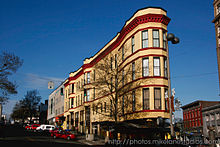Collecting scraps of metal and wood from local lumber stores and recycling centers, families began building shanties (shacks) in order to supply a roof over their heads. Alcohol and suicide became a common event in the Hooverville that eventually gave it its nickname of "Hollywood", because of the Hollywood-style crimes and events taking place in the camp. It would not be until 1956 when the last occupant of "Hollywood" was evicted and the police used fire to level the grounds and make room for industrial growth. [21]
Timeline events of Tacoma's Hooverville "Hollywood on the Tide Flats"
- 1924 – Tacoma starts feeling the coming pinch of the economic crises.
- 1927 – Tacoma's Hooverville is coined "Hollywood" due to the "Hollywood" type crimes coming from the camp.
- 1932–34 – Hollywood breaks out in a rash of problems stemming from alcohol and suicides.
- 1937 – Tacoma holds a committee to assess the "Real Social Problem" in regards to the shantytown.
- 1940 – After eviction notices fail to evacuate the Hooverville, the local police department burns down Hooverville, their first attempt.
- 1956 – The last occupant of Hooverville is removed and the police, for a second time, burn down the remains and flatten the area for industrial growth.
In 1935, Tacoma received national attention when George Weyerhaeuser, the nine-year-old son of prominent lumber industry executive J.P. Weyerhaeuser, was kidnapped[24] while walking home from school. FBI agents from Portland handled the case, in which payment of a ransom of $200,000 secured release of the victim. Four persons were apprehended and convicted. The last to be released was paroled from McNeil Island in 1963. George Weyerhaeuser went on to become chairman of the Board of the Weyerhaeuser Company.
In 1951, an investigation by a state legislative committee revealed widespread corruption in Tacoma's government, which had been organized commission-style since 1910. Voters approved a mayor and city-manager system in 1952.
Tacoma was featured prominently in the garage rock sound of the mid-1960s with bands including The Wailers and The Sonics. The surf rock band The Ventures were also from Tacoma.
Downtown Tacoma experienced a long decline through the mid-20th century. Harold Moss, later the city's mayor, characterized late 1970s Tacoma as looking "bombed out" like "downtown Beirut" (a reference to the Lebanese Civil War that occurred at that time); "Streets were abandoned, storefronts were abandoned and City Hall was the headstone and Union Station the footstone" on the grave of downtown.[25]
Aerial view of central Tacoma. Commencement Bay is at lower right.
The first local referendums in the U.S. on computerized voting occurred in Tacoma in 1982 and 1987. On both occasions, voters rejected 3-1 the computer voting systems that local officials sought to purchase. The campaigns, organized by Eleanora Ballasiotes, a conservative Republican, focused on the vulnerabilities of computers to fraud. [27]
In 1998, Tacoma installed a high-speed fiber optic network throughout the community. The municipally owned power company, Tacoma Power, wired the city.
21st century
Tacoma's Hilltop neighborhood started struggling with crime in the 1980s and early 1990s. Due to its high crime rate, Washington residents nicknamed the city "Tacompton", in reference to Compton, California.[28] The beginning of the 21st Century has seen a marked reduction in crime, as neighborhoods have enacted community policing and other policies.[29] Bill Baarsma (mayor from 2002–2010) is a member of the Mayors Against Illegal Guns Coalition,[30] a bi-partisan group with a stated goal of "making the public safer by getting illegal guns off the streets." The coalition was co-chaired by Boston Mayor Thomas Menino and New York City Mayor Michael Bloomberg.In 2004, Tacoma was ranked among the top 30 Most Livable Communities in an annual survey conducted by the Partners for Livable Communities. [31] In 2009 Tacoma elected its second African-American mayor, Marilyn Strickland.
Downtown revival
Hotel Bostwick, located in Tacoma
Tacoma's downtown Cultural District is the site of the Washington State History Museum (1996) and the Tacoma Art Museum (2013 ). America's Car Museum was completed in late 2011 and resides near the Tacoma Dome in Tacoma. The glass and steel Greater Tacoma Convention and Trade Center opened in November 2004.[32]
The Theatre District of downtown Tacoma is anchored by the Pantages Theater (first opened in 1918). The Broadway Center for the Performing Arts[33] manages the Pantages, the Rialto Theater, and the Theatre on the Square, as well as Tacoma Little Theatre. Other attractions include the Grand Cinema and the Temple Theatr


No comments:
Post a Comment